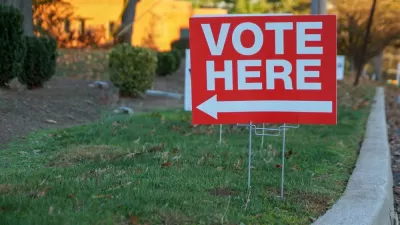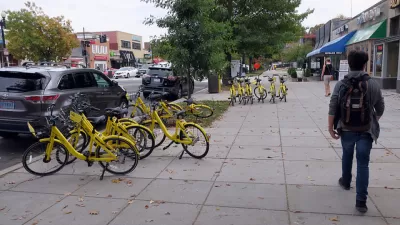Bike-share is continuing its march towards world domination, with seemingly every large Midwestern American city now jumping on the bike lending bandwagon, reports Angie Schmitt.
Pittsburgh, Columbus, Indianapolis, Cleveland, Detroit, Cincinnati, Milwaukee, Chicago, Minneapolis - the list of Midwestern cities that have already, or are hoping to, establish bike-share systems is a testament to the incredible popularity of a concept that's only found its footing in the U.S. in the past few years. Schmitt examines the trend, and the ways in which Midwestern cities have learned from, and adapted, the approach to building such systems undertaken by more dense pioneers.
"Midwestern cities have been inspired by some of the more spectacular examples on the coasts, according to Eric Rogers, executive director of BikeWalkKC, the nonprofit organization that manages Kansas City’s bike-share system. Kansas City was a little ahead of the pack when it launched Kansas City B-Cycle, with 200 bikes at 12 stations, last summer."
“The last few years a lot of cities, especially in the Midwest, have seen good examples from places like Chicago and Portland and New York and D.C. of a lot of innovative facilities that are out there: cycle tracks, bike boxes, bike-sharing,” he said. “There’s so much more knowledge out there now that it’s easier to develop a solution and pursue it.”
"Midwestern metros have also been lured by the availability of new technology and the assistance of companies like B-Cycle and Alta Bikes that make installing these systems relatively easy and affordable," Schmitt adds. "But these new additions to the bike-share family have taken a markedly different approach than some large coastal cities."
“A lot of the Midwest cities started kind of small, maybe with 10 or 12 stations, and they’re growing more organically over time,” Rogers said. “It seems like a lot of the larger coastal cities have taken more of a big-bang approach.”
FULL STORY: Midwestern Cities Race to Adopt, and Grow, Bike-Share

Study: Maui’s Plan to Convert Vacation Rentals to Long-Term Housing Could Cause Nearly $1 Billion Economic Loss
The plan would reduce visitor accommodation by 25,% resulting in 1,900 jobs lost.

North Texas Transit Leaders Tout Benefits of TOD for Growing Region
At a summit focused on transit-oriented development, policymakers discussed how North Texas’ expanded light rail system can serve as a tool for economic growth.

Why Should We Subsidize Public Transportation?
Many public transit agencies face financial stress due to rising costs, declining fare revenue, and declining subsidies. Transit advocates must provide a strong business case for increasing public transit funding.

How Community Science Connects People, Parks, and Biodiversity
Community science engages people of all backgrounds in documenting local biodiversity, strengthening connections to nature, and contributing to global efforts like the City Nature Challenge to build a more inclusive and resilient future.

Alabama: Trump Terminates Settlements for Black Communities Harmed By Raw Sewage
Trump deemed the landmark civil rights agreement “illegal DEI and environmental justice policy.”

Dear Tesla Driver: “It’s not You, It’s Him.”
Amidst a booming bumper sticker industry, one writer offers solace to those asking, “Does this car make me look fascist?”
Urban Design for Planners 1: Software Tools
This six-course series explores essential urban design concepts using open source software and equips planners with the tools they need to participate fully in the urban design process.
Planning for Universal Design
Learn the tools for implementing Universal Design in planning regulations.
City of Santa Clarita
Ascent Environmental
Institute for Housing and Urban Development Studies (IHS)
City of Grandview
Harvard GSD Executive Education
Toledo-Lucas County Plan Commissions
Salt Lake City
NYU Wagner Graduate School of Public Service





























